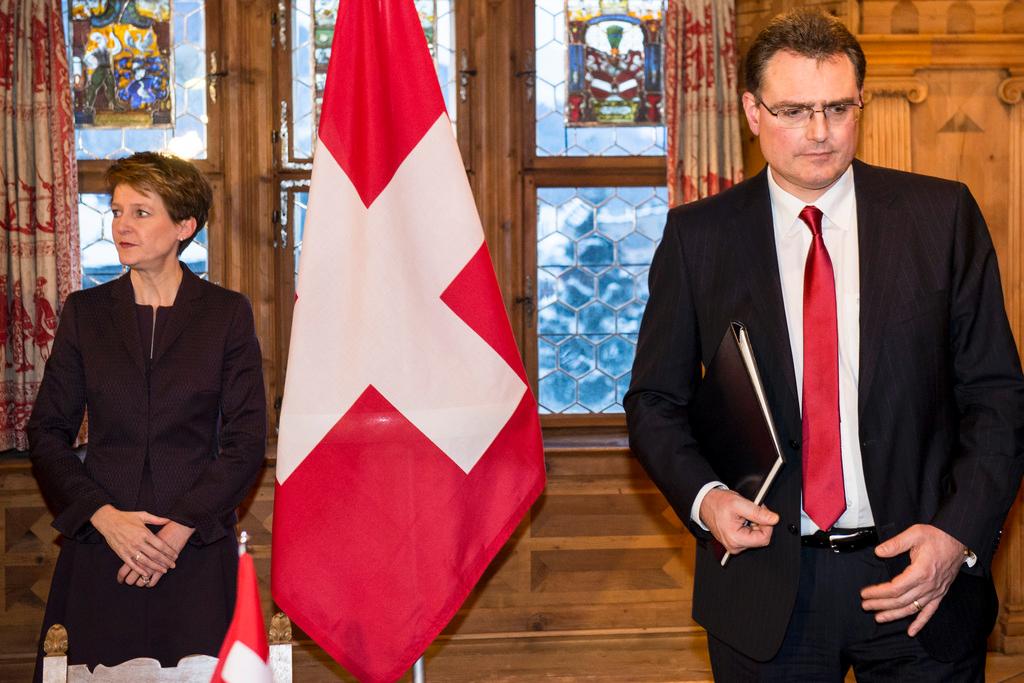National Bank chairman explains Switzerland’s success

Fiscal policy, political independence, innovation and flexibility have all helped strengthen the Swiss economy in the face of challenges, said Thomas Jordan, chairman of the Swiss National Bank (SNB), on Tuesday at the Free University of Brussels.
In a speech titled “Switzerland at the heart of Europe: between independence and interdependence”, Jordan highlighted the features that have helped the country survive periods of economic crisis.
Fiscal policy
The Swiss franc is a strong and important currency which has historically played “a much bigger role in the international financial system than the size of the economy would imply,” said Jordan.
The attractiveness of the currency reflects the stability of the country, he said. However, because Switzerland is not a member of the European Monetary Union, it is particularly dependent on open international markets.
The 40% appreciation in the value of the franc between August 2007 and August 2011, which began with the United States’ subprime crisis, culminated in the introduction of the minimum exchange rate of CHF1.20 per euro on September 6, 2011. This “was only ever meant to be an exceptional and temporary measure”, said Jordan.
The SNB announced discontinuation of the measure on January 15, 2015. “Publishing such a decision as a surprise announcement for the markets and the public was unavoidable,” according to Jordan. “Any guidance would have invited speculative attacks.”
The franc has again appreciated rapidly and massively, Jordan said. Achieving and maintaining economic progress is an ongoing challenge. But “the notion that Switzerland is a sheltered island in the midst of a stormy sea could not be further from the truth”. The country “has consistently pursued prosperity via strong integration in the world economy in general and the European economy in particular.”
Political independence
Switzerland has traditionally been very reluctant to give up its political sovereignty. Federalism and direct democracy are crucial elements of the Swiss identity, said Jordan. And neutrality has allowed Switzerland to largely escape the tragedies that devastated Europe over the past century.
“But autonomy does not mean isolation, or neglect of what happens abroad,” he said. “Switzerland’s political neutrality has often put it in a good position to mediate during conflicts and provide active solidarity.”
In Jordan’s view, Switzerland’s economy is one of the most internationally integrated in the world, and integration has contributed to the country’s prosperity. ”The flipside of the coin, however, is the country’s broad exposure to economic and financial developments abroad, as demonstrated by the global financial crisis and its aftermath.”
Innovation and diversification
Switzerland is much more than banks, watches and chocolate. The Swiss economy, in Jordan’s view, is highly diversified. The goods and services that the country exports are equivalent to half of its gross domestic product. But profound structural changes have been necessary in the last decades to maintain competitiveness.
Within industry, there has been “a constant effort to innovate both products and processes”, said Jordan. Switzerland has one of the highest densities of high technology in the world. Large multinational pharmaceutical and chemical firms are not the only ones investing in research and development; small and medium-sized manufacturing firms “are typically also strong innovators”, with more than 40% of them undertaking R&D – a world record.
Although Swiss exporters have increasingly focused on the US, China, and other emerging economies, they remain strongly dependent on the European market, said Jordan. The EU absorbs more than half of Swiss goods exports, and “the negative impact of the exchange rate is very significant”.
Flexibility
The Swiss labour market tends to be flexible, according to Jordan. Short-time working enables companies to adjust their labour force to temporary shocks and to cut costs during downturns, then expand production when demand picks up again. Disruptive strikes are rare, and negotiations between unions and companies are generally consensus oriented. The employment rate, at 80%, is high, and unemployment insurance is relatively generous. The structure of the labour market, says Jordan, provides “the necessary flexibility for firms to adjust rapidly to changing conditions at home and abroad”.
This doesn’t mean that Switzerland is immune to problems. “The significant overvaluation of our currency means that the Swiss economy, notably the sectors exposed to international competition, is currently facing strong headwinds and a number of challenges,” Jordan said.
“Today more than ever,” concluded Jordan, “the Swiss economy has to focus on its structural strengths and flexibility to ensure its international competitiveness and thus the country’s prosperity in the future.”

In compliance with the JTI standards
More: SWI swissinfo.ch certified by the Journalism Trust Initiative

You can find an overview of ongoing debates with our journalists here. Please join us!
If you want to start a conversation about a topic raised in this article or want to report factual errors, email us at english@swissinfo.ch.